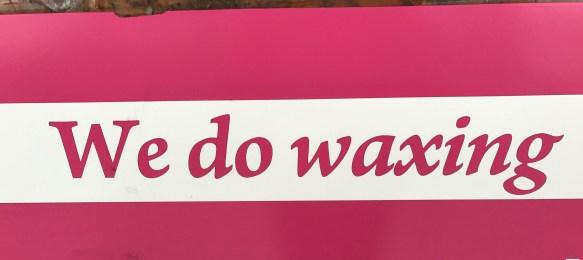A challenge of writing is to distinguish between what’s in the mind and what’s on the page, or, in the case of this blog post, on the sign. No doubt these sign writers thought they were expressing themselves perfectly, but each left me with at least one unanswered question. For example:

Unanswered Question: What do the “gas leaks” say?
I should note that a little punctuation would have gone a long way. A question mark after “leaks” and a period or exclamation point after “us” would do nicely here. On the other hand, clarity may be overrated. I did spend an enjoyable quarter hour thinking up possible dialogue:
COMPANY: Good morning. How may I help you?
GAS LEAK: Hiss …sss … sss.
Longer but not clearer is this one:

Unanswered Questions: Why do “pearls” (plural) outnumber “diamond” (singular)? And does the shop really grind up precious gems? Most important: Does anyone working in this shop actually know what these facials are?
Once again I’m struck by the number of nonsense words employed by the “beauty” industry. I read a Sunday NY Times feature on skin and hair care for several weeks before I realized that it was not, in fact, a parody. Moving on:

Unanswered Questions: How many passengers need a DNA Kit? Can’t they check their genetic heritage at home? Does the transit authority seriously believe that a robber will stand still long enough for a cheek swab?
The difference between “may be” and “is” seems significant, but I can’t quite figure out why. My best guess is that the MTA wants you to know that they are not necessarily watching but they are always ready to roll when it comes to your genes. Last one:
 Unanswered Question: What happened to the candlestick maker?
Unanswered Question: What happened to the candlestick maker?
I did toy with the idea that the “butcher” chops up a “prime” number — not into factors, but maybe into pieces, like severing the top circle of an eight from the bottom. That interpretation leaves out the “baker,” who may bake less than prime quality bread and cake. Perhaps that’s why the candlestick maker quit.








 Do you call the front desk for “boom service,” and if so, how much do you tip the guy who lowers the boom? How do you delivery a “jobsite”? And what does a “boom service” showroom show?
Do you call the front desk for “boom service,” and if so, how much do you tip the guy who lowers the boom? How do you delivery a “jobsite”? And what does a “boom service” showroom show?






















